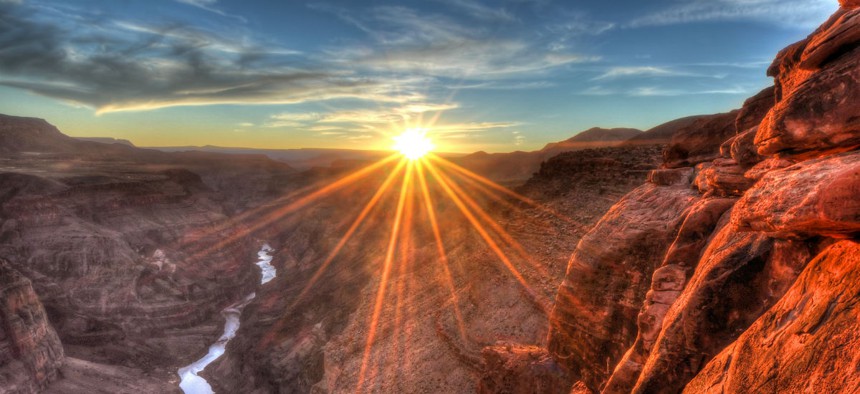
Sierralara / Shutterstock.com
Upskirt Photos and Twerking: Sexual Misconduct at the National Park Service
IG cites Grand Canyon regional unit for covering up pervasive abuse.
A group of National Park Service employees stationed at the Grand Canyon has demonstrated a “long-term pattern” of sexual harassment, according to a new report, with nearly three dozen employees reporting or witnessing inappropriate behavior over the last 15 years.
The instances of “discrimination, retaliation and a sexually hostile work environment” often went unreported or were not properly investigated, according to an Interior Department inspector general report. Thirteen current and former NPS employees at the Grand Canyon National Park’s River District originally made the complaint in a letter to Interior Secretary Sally Jewell in 2014, which led to the IG’s investigation.
The misconduct allegedly took place during the NPS-led “river trips,” conducted about 12 weeks per year for education, scientific research or maintenance of trails and shorelines. The trips last up to several weeks and participants come from a variety of other departments within the Grand Canyon National Park. During these trips, employees told the IG, River District workers leading them attempted to take photos up a woman’s skirt, “repeatedly” propositioned an employee for sex and “inappropriately touched” a female employee’s back and buttocks.
In one instance, a river trip leader yelled at a female employee while holding an axe and intoxicated. One NPS employee left the NPS’ Grand Canyon unit after nine years due to “undue levels of stress” caused by the treatment, the IG said.
Some NPS employees reported that after they refused sexual advances, the river trip organizers withheld food and prevented them from completing their assigned tasks for the trip. One employee said she suspected one of the trip leaders placed “ammunition cans containing human waste near her tent,” while others said the accused River District workers publicly berated female employees who had rejected them.
Another employee told the IG she witnessed a trip organizer lying next to a woman who was asleep while intoxicated. The employee said she confronted the organizer, who stood up, buckled his pants and walked away.
The IG interviewed a human resources official who has worked in the region since 1996, who said there was a sense that “what happens on the river, stays on the river.” The officer said she was aware of the accusations, but that management had not notified HR of “many of the incidents of sexual harassment.”
The accusations focused on four employees, three of whom have since separated from NPS. The current employee denied any wrongdoing, while conceding he had consensual sex with women while on the trips and off duty. In 2014, at least one of the accused in turn reported that two employees passed out penis-shaped straws and were inappropriately “twerking” during a dance party at the end of a trip. The employees said the accusations against them were only in retaliation to their previous complaints.
Both of those employees were not offered positions once their term appointments expired, and one of them received a 14-day suspension. Several employees told the IG the investigation into the dance party incidents was “insufficient and incomplete.” The superintendent of the Grand Canyon region told the auditors the discipline they received was “inconsistent with previous actions taken against employees for sexual misconduct.”
Three of the four river trip leaders accused of misconduct were suspended on one occasion since 2003 for varying lengths of time ranging between five and 30 days, but none were fired. Two other employees were fired, one in 2006 and one in 2011, for “misconduct of a sexual nature.”
In 2014, the River District implemented new procedures to “make river trips safer and less hostile for all employees,” including mandated pre-trip briefings and restricting alcohol consumption.
James Doyle, an NPS spokesman, said the agency is taking the report "very seriously" and reviewing the document "carefully."
"The behavior cited in the report is, simply, unacceptable," Doyle said. "No NPS employee should ever experience the kind of behavior outlined in the report, and it is even more disappointing because previous efforts to change the culture at the River District failed to improve working conditions. We have zero tolerance for the behavior described in the OIG report."
He added NPS has "great empathy" for the victims of sexual misconduct, and promised a culture change as well as "additional changes to improve the working conditions at the Grand Canyon and to support the reporting, investigation of and response to cases of hostile work environment and sexual harassment."
"Changes start now," Doyle said.
The U.S. Attorney’s Office in Arizona declined to prosecute any individuals identified in the report, the IG’s office said. The auditor provided the report to Jewell “for action.”
Rep. Jason Chaffetz, R-Utah, chairman of the House Oversight and Government Reform Committee, blasted NPS for its failure to properly deal with the malfeasant employees, saying he planned to introduce legislation to make it easier to discipline federal workers.
“This is another appalling example of how the current civil service system allows the wrong people to be insulated and protected,” Chaffetz said. “Supervisors and managers are failing in their management responsibilities and they should be removed. The culture of overlooking and even rewarding bad behavior is inexcusable.”
(Image via Sierralara / Shutterstock.com)







